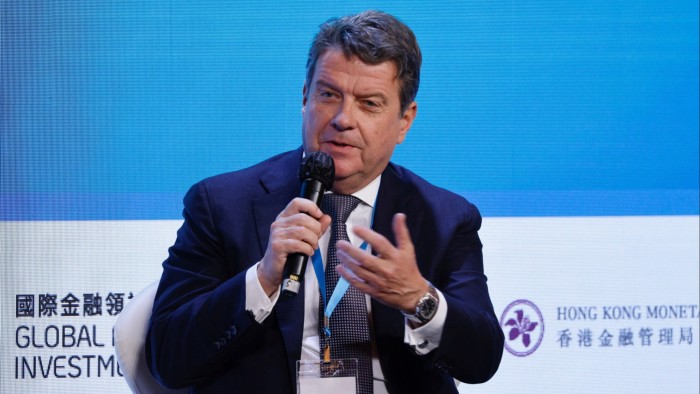Global bankers ‘very pro-China’, says UBS chair

Simply sign up to the Chinese business & finance myFT Digest -- delivered directly to your inbox.
Global bankers are all “very pro-China”, UBS chair Colm Kelleher said at a financial forum in Hong Kong, where Chinese officials sought to woo rattled international investors on Wednesday.
Hong Kong is seeking to boost its status as an international financial centre at the conference, after a clampdown on civil society and years of strict pandemic restrictions triggered an exodus and raised concerns the city was losing business to rival Asian hub Singapore.
Chinese officials used pre-recorded video interviews to reassure international investors of the country’s economic strength as it battles a property sector crisis and flagging growth induced by its strict zero-Covid policy.
“We’re not reading the American press, we actually buy the [China] story,” said Kelleher, chair of the world’s biggest wealth manager. “But it is a bit [of a matter of] waiting for zero-Covid to open up in China to see what will happen.”
His reference to the media was an apparent joke and a nod to earlier remarks made by Fang Xinghai, vice-chair of the China Securities Regulatory Commission, during a pre-recorded segment of the event.
Fang told attendees: “I would advise international investors to find out what’s really going on in China and what’s the real intention of our government by themselves. Don’t read too much of the international media.”
Fang’s comments, which came after a record sell-off of Chinese equities last week in the wake of President Xi Jinping’s consolidation of power, prompted laughs and applause from the audience. “Don’t bet against China and Hong Kong,” he added.
Kelleher was speaking on a panel with Goldman Sachs chief David Solomon, Morgan Stanley chief James Gorman, Blackstone chief financial officer Michael Chae and Bank of China president Liu Jin.
Earlier in the day, Yi Gang, governor of the People’s Bank of China, said he hoped to “achieve a soft landing” when asked about the central bank’s support and outlook for the property market, which has been battling a liquidity crisis and wave of defaults.
State-run media in China have pushed a narrative of economic resilience and recovery coming out of the Communist party’s 20th congress, where Xi secured an unprecedented third term as leader.
Analysts, however, say China’s economic outlook has been deteriorating in recent months as Xi’s strict zero-Covid policy has led to lockdowns across large swaths of the country.
Among the latest high-profile lockdowns reported by international media this week include the shutting of Shanghai Disneyland after one guest tested positive for Covid-19 and the fleeing of workers in the world’s largest iPhone factory in Zhengzhou to escape the threat of quarantine.
“China’s overall lockdowns have been steadily tightening since August and ratcheted further over the past month,” said Ernan Cui, an analyst at Gavekal Dragonomics in Beijing.
“Even if the Covid containment regime remains largely effective and another wave of lockdowns is mostly avoided, the cost of controlling the sub-variants is clearly rising fast and will further drag on the economy,” Cui said.
The Hong Kong government has made a particular point of ensuring the forum goes forward as planned, allowing attendees some respite from certain pandemic restrictions that apply elsewhere in the city.
Financial secretary Paul Chan mingled with the crowd of financiers and spoke without a mask, despite recently testing positive for Covid.
On the sidelines, HSBC chief executive Noel Quinn said he believed China’s prospects were positive when asked if he felt Hong Kong was back in business.
In an apparent rejoinder made later in the day, Mark Carney, the former Bank of England governor, told attendees: “I’d like to commend the international media, and I believe what I read in the international media.”
Comments